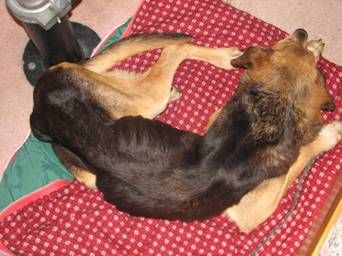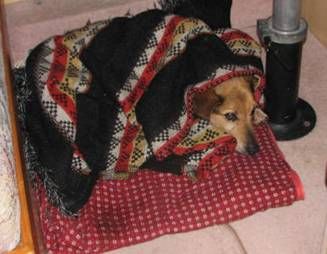Our holiday was not without animal involvement and the extreme heartbreak that so often comes when one is unwilling to ignore a creature in need.
Although we found the East Cape to be one of the most picturesque and unspoiled areas in the country, the animal cruelty, suffering, abuse and neglect in that region made it a hostile environment for those with compassionate lifestyles. It is an area bereft of veterinary clinics, so people living on the breadline take care of their animals according to their means (this regularly involves a gun), rather than drive the long distances to Opotiki or Gisborne for professional care.

It is a region where pig hunting is widely practiced in all its gory glory – extreme violence is perpetrated by humans and pig dogs against innocent pigs which finally results in the death of the pig by knife. Often the dogs are mortally gored while attacking the pigs’ testicles, ears, tails and other body parts resulting in wounds that the lucky ones will survive and have taken care of by a vet. Hunting of many creatures is encouraged by competitions offering trophies for the largest deer, pig, fish, etc. We found carcasses of goats left on the roadside and a “killing tree” where the locals butcher animals and leave their skins hanging over the tree branches.
De-sexing of an animal is uncommon, so many homeless cats and kittens are drowned or hit on the head when they become a nuisance through their scavenging.
It is a popular fishing ground and we witnessed the throats being ripped from Kawhai while bloodied hands wrenched hooks and lips from countless hapless fish or drove spikes into their heads.
Abandonment of dogs is common. When some folk leave town, they leave their dogs to fend for themselves, resulting in starvation which leads to attacks on chickens and sheep, which leads to the dogs being hunted down and shot.

Such an event lead us to the dear sheepdog we named Sophie. We couldn’t drive past the skeletal dog we saw eating cow faeces on the side of the road on Good Friday. We pulled over and walked back to her with food in hand. She timidly ate some of the lentil stew, the bread and vegemite and the nutmeat – while, with heavy hearts, we saw the massive growth protruding from her neck and under her throat. Although she could scarcely walk, we led and then carried her into the motor home and tried to locate someone who could help. After being chased by eight dogs on one property we finally found a family at home who directed us to the local shepherd. The shepherd recognized Sophie and told us her “caregiver” had gone to live in Gisborne some time ago. He also told us that he expected she would recover from her emaciation as his own pig dogs often came home looking “worse than that” when they “go walkabout” for a week or so. I couldn’t imagine a dog more wasted and noted that his own dogs were thin and scarred and one was unable to put her foot on the ground.
Sophie joined us in the camping ground that night and we covered her frame with blankets to keep her warm. She purred a soft growl when given attention and pushed against me for comfort causing my tears to flow. A holidaying vet nurse in the camp also advised that she had seen skeletal dogs return to health, but she wasn’t confident that the growth was treatable. The next day we made a mercy dash to Eastland Veterinary Services in Gisborne where Tina, the caring Easter weekend vet, bent over backwards to help us with Sophie.

Because it was a long weekend, blood tests would not be sent to Hamilton until the Tuesday or the results known until Wednesday – so we made Gisborne our base for several days. If, as Tina suspected, the results indicated an aggressively malignant cancer, we would end her suffering. If not, we would immediately take her back to the Veterinary Specialist Group in Auckland and attempt to have the 1.5kg growth removed. Local blood tests and an X-ray were taken while Sophie was put on a drip in constant hospital care with many injured pig dogs in the surrounding enclosures. We visited her for lengthy periods each day often succeeding in feeding her when the staff had been unable to. Sadly, as she ate, the growth expanded at an alarming rate until she could scarcely open her mouth to take food. Still she welcomed our visits, raising her eyebrows in recognition and wagging her usually still tail on just one cherished occasion. And always she ate from my hand and purred her pleasure at being touched.
Unfortunately the area the blood sample was taken from rendered inconclusive results. The pathologist asked for a sample nearer to the rim of the growth or for a biopsy (which would require an anaesthetic). That would mean another overnight courier. None of us were confident that Sophie would survive an anaesthetic or that her throat and airway would remain open long enough for us to get her to the VSG in Auckland…or that such a large and venous growth could be removed. At Tina’s recommendation and with unbearable grief we gave her a final meal and cuddles and had our beautiful girl put to sleep. She died while taking a last piece of food from my fingers – surrounded by love, comfort, warmth and a full belly – perhaps for the first time in her life.
We headed straight to the nearest hot pools and wept the loss of this gentle, doe-eyed creature into the soothing, steaming waters… Thankfully, the remainder of our holiday was without anguish.
Although Tina was kind enough to heavily discount Sophie’s vet bill for me, it still amounted to $743.80. If you are able to help me with this huge unexpected cost, please send your cheque to:
Linda Nunn (Animal Re-homing)
PO BOX 35-298
Browns Bay
North Shore City
Auckland 0753
Or direct donations may be made to: Animal Re-homing bank account
Linda Nunn Animal Re-homing
Account number: 12 3042 0208233 01



